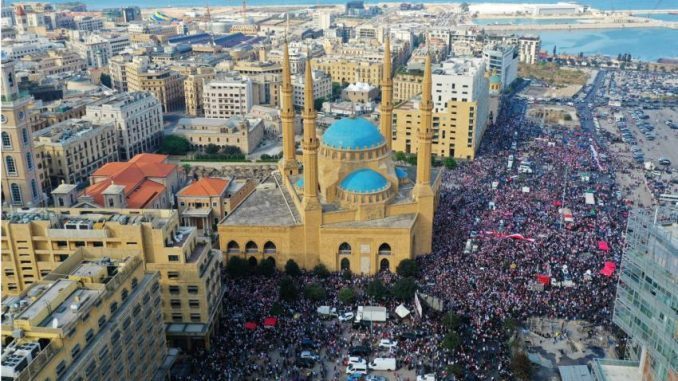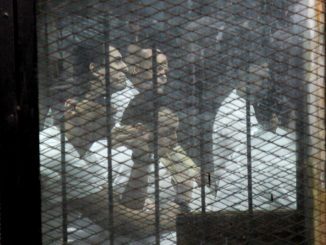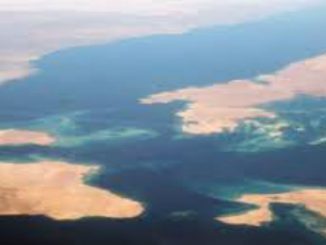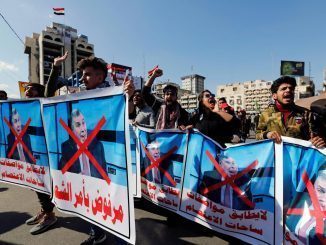
The Lebanese parliament convened this morning to conduct a confidence vote for the new government, despite attempts by protesters to prevent the assembly from taking place.
Speaker of the House, Nabih Berri stated that 67 dignitaries arrived at the parliament building, later rising to 68, with 65 the minimum needed to open the meeting.
Berri noted that former Prime Minister Saad Hariri’s Future Movement party MPs were not in attendance despite the bloc’s decision to attend the meeting but deny the government a vote of confidence.
Fifteen Lebanese Forces MPs, a Christian based political party and former militia during the civil war, were seen outside the parliament this morning, allegedly discussing their decision to enter the building, despite intending to vote against giving the government confidence.
Large numbers of Internal Security Forces and Army were deployed on the ground with full gear early this today, in preparation for violent clashes. Lebanon has faced mass protests since October 2019, over a worsening economic crisis and political deadlock. The formation of the government on 22 January failed to quell discontent and protests have become increasingly violent.
Amal and Hezbollah supporters were seen escorting MPs to the parliament building on motorbikes. Supporters later threw rocks at protesters in the Downtown area and hit people with sticks.
Demonstrators also attempted to prevent MPs from reaching the parliament building by blocking roads, and resorted to throwing eggs, rocks and balloons containing paint at cars.
Cement slabs which have been erected by the Lebanese Army in recent weeks to protect the Downtown areas of Beirut, and block paths to the parliament building, were also torn down.
Local English language newspaper, the Daily Star reported a sighting of a man shooting at protesters with a handgun in Zoqaq Al-Blat in Beirut. Protesters later broke into a Downtown branch of Blom Bank and set the interior on fire.
“Riots and attacking public and private property distort the demands of protesters and do not help them achieve [the demands],” the army said in a statement released this morning.
The Lebanese Red Cross reported 39 hospitalized, and 241 treated at the scene for injuries sustained after riot police released tear gas, shot rubber bullets and water cannons to disperse protesters as early as 7:30am. At least three protesters lost consciousness.
One MP, Salim Saadeh, from the Syrian Socialist Nationalist Party, was taken to hospital after he was beaten and had his car smashed by protesters, local news channel Al Jadeed reported.
In statements made inside the parliament, Prime Minister Hassan Diab warned of collapse, saying that “anyone who thinks that they will survive any economic collapse or from people’s anger is wrong”.
Diab then called for confidence through action, and reaffirmed Lebanon’s commitment to an independent foreign policy, and the liberation of Lebanese territories occupied by Israel.
Aoun calls on security services to face protesters
Lebanese President Michel Aoun last Friday called on the security services: “Not to compromise any attempt to undermine the sovereignty of the state, its institutions and its official headquarters.”
According to a statement issued by the Lebanese presidency, which Anadolu Agency obtained a copy of, these remarks came during a meeting of the Supreme Defense Council, chaired by Aoun.
Aoun also called on security services to cooperate with one another in order to take the necessary measures to control the security situation in the country and maintain stability and civil peace.
The Lebanese prime minister, Hassan Diab, also stressed the necessity of intensifying mutual coordination between the various military and security agencies, to stabilize the situation and anticipate what he describes as “sabotage events”.
The Supreme Defense Council held a meeting at the request of Aoun at the Republican Palace, east of Beirut.
The meeting was attended by the prime minister, ministers of finance, national defense, foreign affairs and emigrants, interior and municipalities, economy, trade and justice.
The army chief and leaders of the military and security services were also present in the meeting.
On 21 January following his meeting with Aoun, Diab announced the formation of a new government after months of tireless negotiations.
Diab’s government will replace Saad Hariri’s, who resigned on 29 October, under the pressure of popular protests that took place in the country since 17 October.
Protesters demanded an independent and competent government, capable of tackling the political and economic situation in a country enduring the worst economic crisis since the Lebanese Civil War of 1975-90.
They also called for early parliamentary elections, the independence of the judiciary and the departure of the remaining ruling class, in addition to holding those they accuse of corruption and incompetence accountable.



